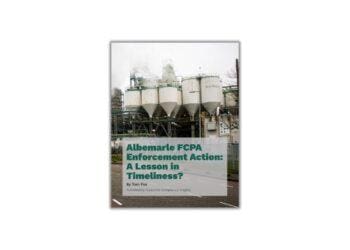Citizens Press for Government Reform
Organizations doing business in Mexico well do well to remain up to speed on the country’s National Anti-Corruption System (the SNA). Mexico remains one of the highest-risk jurisdictions in the Americas, an ignoble distinction it’s held for several years. The SNA is, therefore, a welcome development to organizations unwilling to participate in the corruption so prevalent in the region.
This article was republished with permission from FCPAméricas Blog, for which Matteson Ellis is founder, editor and regular contributor.
Adoption of the many components of Mexico’s new National Anti-Corruption System (the Sistema Nacional de Anti-Corrupción or “SNA”) is well underway. The Mexican government amended the country’s constitution on May 27, 2015, to allow for the SNA to move forward. President Peña Nieto signed into law new anti-corruption legislation on July 18, 2016 as part of the system. The Mexican Senate is now overseeing the selection process for the newly established National Anti-Corruption Prosecutor. And the General Law of Administrative Liabilities, a key component of the SNA, will enter into force on July 19, 2017.
This post and the next highlight key aspects of the SNA that companies and individuals doing business in Mexico should know.
Considerable Corruption Risk in Mexico Makes the SNA Highly Relevant
When it comes to corruption risk, Mexico is not just any country. It is seen as one of the highest risk jurisdictions in the Americas. The familiarity that foreigners often feel when doing business in Mexico also has the potential to mask bribery risks that might otherwise be at play. In fact, Mexico remains the country in the region that has generated the most FCPA cases. In the 2016 Latin America Corruption Survey, Mexico was viewed as one of the four most corrupt countries in the region, a finding that was consistent with Mexico’s ranking when the survey was conducted in 2008 and 2012. Almost half of respondents to the survey who work in Mexico think their company has lost business to competitors willing to pay bribes, and only about 10 percent reported the issue to authorities. More than half of respondents think corruption is a “significant obstacle” to doing business in the country. Given these types of risks, the SNA is a welcome development to the international business community.
Pivotal Role of Mexican Civil Society
As highlighted in this article, Mexican NGOs, academics and anti-corruption experts have played a critical role in guiding the SNA’s adoption. Civil society kept the heat on state legislatures that had to approve the Constitutional amendment. Civil society designed the SNA legislation through a “citizen initiative” process that allows citizen groups to file bills in Congress. There is now a central role in the SNA for a Citizen Participation Committee made up of five private individuals appointed by the Senate who, among other things, liaise with nongovernmental organizations. The first group of representatives to this Committee has been selected, and they are making robust plans. This close involvement of civil society suggests there will be sustained pressure on the Mexican government to follow through with plans for the SNA’s implementation.
Reform Reaches Local Government
Perhaps the highest levels of corruption risk in Mexico these days are found locally, where state and municipal officials create persistent problems for businesses. Those participating in the current energy reform opportunities find that government officials at the federal level, for a large part, have been professional and clean and have shown a vested stake in making reform successful. But when companies start to operate at local levels, bribery issues begin to arise. This anecdotal evidence is supported by data. In the 2016 Latin America Corruption Survey, 87 percent of respondents who work in Mexico said there is “significant corruption” at the local and municipal levels, the highest risk level recorded for all government areas surveyed. Lower risk levels were noted in the executive branch (62 percent), legislative branch (49 percent) and judicial branch (54 percent). Given this, it is highly relevant that the SNA includes mechanisms to address misconduct at state and municipal levels. In particular, the system is designed to coordinate anti-corruption and other controls bodies at all levels of government. It gives the federal government audit authority over federal funds allocated to the states; these funds traditionally represent a significant amount of financial support. It creates an expectation that states will establish their own anti-corruption systems and anti-corruption prosecutors and has monitoring mechanisms in place to highlight when they fail to do so.
Rules Tightened for Local Officials
Impunity is a historic problem in Mexico. Local officials often find themselves free to engage in bribe schemes with little potential negative consequence. With new SNA rules, that dynamic has the potential to change. Pursuant to the SNA, the new General Law of Administrative Liabilities requires public servants to disclose tax returns, submit statements of assets and declare conflicts of interest. Local officials involved in public procurements must now comply with special protocols. The new legal framework establishes suspension, dismissal and economic sanctions for “serious administrative offenses” committed by public servants, including bribery, embezzlement, misuse of public resources and collusion.
Part 2 of this series will discuss aspects of the SNA particularly important to non-Mexican companies and individuals.
The opinions expressed in this post are those of the author in his or her individual capacity and do not necessarily represent the views of anyone else, including the entities with which the author is affiliated, the author`s employers, other contributors, FCPAméricas or its advertisers. The information in the FCPAméricas blog is intended for public discussion and educational purposes only. It is not intended to provide legal advice to its readers and does not create an attorney-client relationship. It does not seek to describe or convey the quality of legal services. FCPAméricas encourages readers to seek qualified legal counsel regarding anti-corruption laws or any other legal issue. FCPAméricas gives permission to link, post, distribute or reference this article for any lawful purpose, provided attribution is made to the author and to FCPAméricas LLC.



 Matteson Ellis serves as Special Counsel to the FCPA and International Anti-Corruption practice group of Miller & Chevalier in Washington, DC. He is also founder and principal of Matteson Ellis Law PLLC, a law firm focusing on FCPA compliance and enforcement. He has extensive experience in a broad range of international anti-corruption areas. Previously, he worked with the anti-corruption and anti-fraud investigations and sanctions proceedings unit at The World Bank.
Mr. Ellis has helped build compliance programs associated with some of the largest FCPA settlements to date; performed internal investigations in more than 20 countries throughout the Americas, Asia, Europe and Africa considered “high corruption risk” by international monitoring organizations; investigated fraud and corruption and supported administrative sanctions and debarment proceedings for The World Bank and The Inter-American Development Bank; and is fluent in Spanish and Portuguese.
Mr. Ellis focuses particularly on the Americas, having spent several years in the region working for a Fortune 50 multinational corporation and a government ethics watchdog group. He regularly speaks on corruption matters throughout the region and is editor of the FCPAméricas Blog.
He has worked with every facet of FCPA enforcement and compliance, including legal analysis, internal investigations, third party due diligence, transactional due diligence, anti-corruption policy drafting, compliance training, compliance audits, corruption risk assessments, voluntary disclosures to the U.S. government and resolutions with the U.S. government. He has conducted anti-corruption enforcement and compliance work in the following sectors: agriculture, construction, defense, energy/oil and gas, engineering, financial services, medical devices, mining, pharmaceuticals, gaming, roads/infrastructure and technology.
Mr. Ellis received his law degree, cum laude, from Georgetown University Law Center, his masters in foreign affairs from Georgetown’s School of Foreign Service, and his B.A. from Dartmouth College. He co-founded and serves as chairman of the board of
Matteson Ellis serves as Special Counsel to the FCPA and International Anti-Corruption practice group of Miller & Chevalier in Washington, DC. He is also founder and principal of Matteson Ellis Law PLLC, a law firm focusing on FCPA compliance and enforcement. He has extensive experience in a broad range of international anti-corruption areas. Previously, he worked with the anti-corruption and anti-fraud investigations and sanctions proceedings unit at The World Bank.
Mr. Ellis has helped build compliance programs associated with some of the largest FCPA settlements to date; performed internal investigations in more than 20 countries throughout the Americas, Asia, Europe and Africa considered “high corruption risk” by international monitoring organizations; investigated fraud and corruption and supported administrative sanctions and debarment proceedings for The World Bank and The Inter-American Development Bank; and is fluent in Spanish and Portuguese.
Mr. Ellis focuses particularly on the Americas, having spent several years in the region working for a Fortune 50 multinational corporation and a government ethics watchdog group. He regularly speaks on corruption matters throughout the region and is editor of the FCPAméricas Blog.
He has worked with every facet of FCPA enforcement and compliance, including legal analysis, internal investigations, third party due diligence, transactional due diligence, anti-corruption policy drafting, compliance training, compliance audits, corruption risk assessments, voluntary disclosures to the U.S. government and resolutions with the U.S. government. He has conducted anti-corruption enforcement and compliance work in the following sectors: agriculture, construction, defense, energy/oil and gas, engineering, financial services, medical devices, mining, pharmaceuticals, gaming, roads/infrastructure and technology.
Mr. Ellis received his law degree, cum laude, from Georgetown University Law Center, his masters in foreign affairs from Georgetown’s School of Foreign Service, and his B.A. from Dartmouth College. He co-founded and serves as chairman of the board of 






